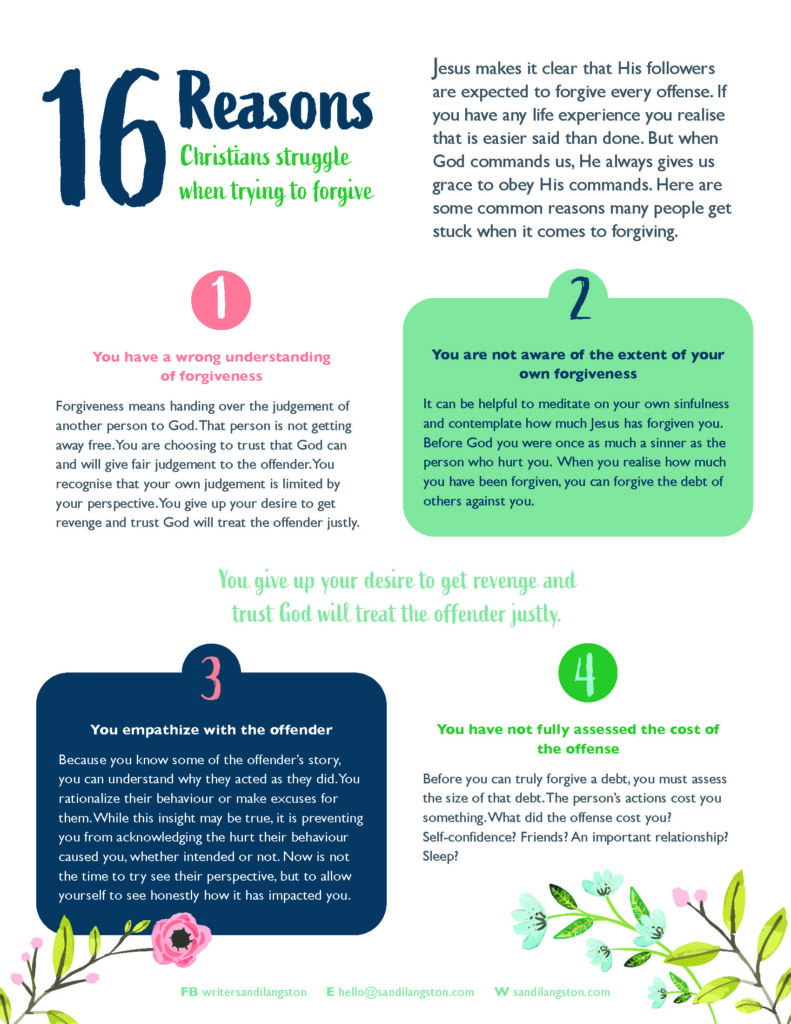Forgiveness versus Boundaries
What is the difference between forgiveness and boundaries? Are we supposed to forgive everyone everything? Is that even possible? What about abusive situations? Jesus taught His followers to “turn the other cheek” instead of retaliating against someone who hit them (Matthew 5:39). Does this mean Christians are not supposed to set boundaries?
Here’s the short answer: Forgiveness and setting boundaries are two separate but related issues. The Bible is clear that Christians are commanded to forgive everyone everything. It’s not just a tall order – it’s impossible. But we must remember this is a spiritual matter. Like salvation, “what is impossible with people is possible with God” (Mark 10:27).
We forgive in faith because God commands us to, but we establish healthy boundaries because we do not allow others to treat us abusively. So, in this blog and the next one to come, let’s discover the difference between forgiveness and setting boundaries, and why both are important.
What does “setting boundaries” mean?
If you hired a house sitter and they vandalised your home, you’d have reason to be mad. Once you’ve calmed down a bit (and sent them a huge bill), you could forgive them, but trust them with your house key again? No way.
It’s the same with our hearts. We must forgive everyone who hurts us, but we don’t have to keep giving them the key to our heart. We can treat the offender respectfully as we do every person, but we can choose whether or not to trust them in that area again (depending how serious the offense.)
A boundary is “something that indicates or fixes a limit or extent.” Think of a fence. This far is okay, but trespassing is not. Some relationships just need a boundary marker, but abusive, manipulative, or consistently disrespectful relationships may need a 10-foot concrete wall with electric barbed wire on top.
Boundaries in the Bible:
The Bible is full of examples of boundaries, though it may take a little while to recognise them as boundaries.
Examples of expectations for behaviour:
- It was okay (encouraged) for Adam and Eve to eat the fruit of almost every tree in the Garden of Eden. It was not okay for them to eat the fruit of one specific tree. The consequence for violating the boundary was (spiritual) death, a curse, and being evicted from the garden.
- It was okay (commanded) for Israel to worship Yahweh alone. It was not okay for them to worship other gods. The consequence for disobedience was eventually exile.
- It is okay (encouraged) for us to live by the Spirit (Galatians 5:16). It is not okay (discouraged) for us to live by the flesh. Each person decides, but the consequence for living by the flesh is eternal separation from God (v.21). Note this consequence continues in the future.
Examples of saying no:
- Jesus withdrew from the crowds (he temporarily said no to their ongoing needs and requests) to spend time alone with the Father.
- Jesus ministered in Jewish regions, healing and delivering Jews, not Gentiles. The Canaanite woman in Matthew 15:21-28 was an exception. (Later the good news was opened to all nations.)
- The Holy Spirit would not allow Paul to preach the gospel in the province of Asia or enter Bithynia on his second missionary journey (Acts 16:6-7).
Submitting to abusive treatment in the Bible
There are some confusing situations in the Bible when it comes to boundaries. For example, Jesus forgave His perpetrators as He was being crucified. They trespassed every single boundary. They did not give Jesus the respect every person deserves, let alone the glory He deserved as God.
In a nutshell, Jesus’ death on the cross was part of God’s plan for the redemption of His creation, and it was a demonstration of God’s love and glory. It is hard for us to grasp how submitting to abuse can be an act of love, but keep reading. (Please, this is NOT a reason to remain in an abusive relationship!)
Other times it was not okay for the crowds to try kill Jesus. As a consequence, He removed Himself from their presence (John 8:59, 10:39).
Some Jews stoned Paul (major boundaries crossed), but it was not in God’s plan for him to die yet. They left him for dead, and afterwards Paul got up and went back into the city (Acts 14:19-20). He continued to preach the gospel, the very thing that got him stoned in the first place. Talk about loving people despite their unacceptable behaviour!
Those are extreme examples, but what does Jesus expect from His followers?
Turning the other cheek?
Jesus taught, “You have heard that it was said, ‘Eye for eye, and tooth for tooth.’ But I tell you, do not resist an evil person. If anyone slaps you on the right cheek, turn to them the other cheek also. And if anyone wants to sue you and take your shirt, hand over your coat as well. If anyone forces you to go one mile, go with them two miles” (Matthew 5:38-41).
Does this mean that Christians are not to set boundaries? No. There is something greater going on here.
To retaliate when sinned against is not an option for the Christian, for then we are also guilty of sin. Retaliation or revenge lowers us to the level of the sinner instead of inviting him or her up to a higher level.
We must remember – no matter the magnitude of someone’s sin against us – they are not our real enemy. We are not fighting “against flesh and blood, but against the rulers, against the authorities, against the powers of this dark world and against the spiritual forces of evil in the heavenly realms” (Ephesians 6:12). Those evil powers influence people to sin against others, but God still loves those people.
The only way it is possible to turn the other cheek, offer another garment, or go the extra mile with a good attitude is by God’s supernatural love in our hearts. Human love can’t accomplish that. To carry out these additional actions with hatred rather than love in our hearts defeats the purpose.
Keep in mind that this teaching is part of the Sermon on the Mount (Matthew 5-7), most of which is impossible to keep by human effort. Only by God’s Spirit in us can we begin to come close to being pure in heart, rejoicing in persecution, loving our enemies and praying for them.
It is as though, by turning the other cheek, we choose to lay aside the appropriate boundaries out of love for the other person. We choose to serve – sometimes even to give our lives – because we believe it will draw the offender closer to God.
BUT we can only willingly lay aside our boundaries if we are clear at least in our minds what those boundaries are. So here are some practical tips for setting healthy boundaries.
Boundaries in Practice
There are four main components to healthy boundaries in relationships:
1. Set a suitable limit
Think of this as defining the property line. What is okay? What is not okay?
- It is okay for you to (bring up an issue with me as long as your tone of voice is respectful).
- It is not okay for you to (arrive late without texting me).
Other questions to ask yourself:
- When and how is it okay to be contacted by this person?
- How do I wish to be addressed by this person?
- Which topics are open for discussion, and which are not?
- What behaviour is acceptable, or not?
2. Communicate the boundary clearly
It doesn’t help to expect the other person to know what your boundaries are. You need to communicate them kindly but firmly.
- It’s okay / not okay to _______.
Even if someone becomes upset or tries to lay a guilt trip on you, you can assure them assertively that you will happily engage with them as long as they respect your boundaries. (PS, don’t be fooled by so-called “boundaries” that are an excuse for manipulation.)
State an appropriate consequence for violating the boundary
There is no point to a boundary without a consequence for violating it. A consequence is something you are in control of, expressed by an I will statement:
- If you _______, I will _______ .
- If you speak to me disrespectfully, I will give you one warning. If you continue to do so, I will end the conversation (hang up / walk away).
- If you do not pay back the money I loaned to you, I will not loan money to you again.
Follow through with the consequence when necessary
This is perhaps the most important step when beginning to establish boundaries in what may have been an unhealthy relationship. Be careful to choose only consequences you are prepared to enforce.
It’s not your problem if the person gets upset with you. You gave them fair warning. Hopefully they will have learned their lesson for the next time.
If someone repeatedly violates a boundary, you may need to restate it more firmly or make the consequence more serious. If someone consistently respects your boundaries, they may earn your trust. You can change your boundaries, just be sure to communicate clearly where the new boundaries lie.
Resources on setting healthy boundaries
- Henry Cloud and John Townsend’s Boundaries
- Lysa Terkeurst’s Good Boundaries and Goodbyes (I have not read this one yet!)
- I came across this excellent blog on boundaries and the Bible, by Cherith Peters.
Need help forgiving?
We all need help to forgive sometimes. Reach out to trusted friends or a counsellor. Cry out to God to help you forgive. Read this blog on forgiving. And perhaps this downloadable pdf can help clear some obstacles: 16 Reasons Christians struggle to forgive – sign up on this page to receive it (in the side bar or below).
Photo credit: cropped from Annie Spratt‘s photo on Unsplash



